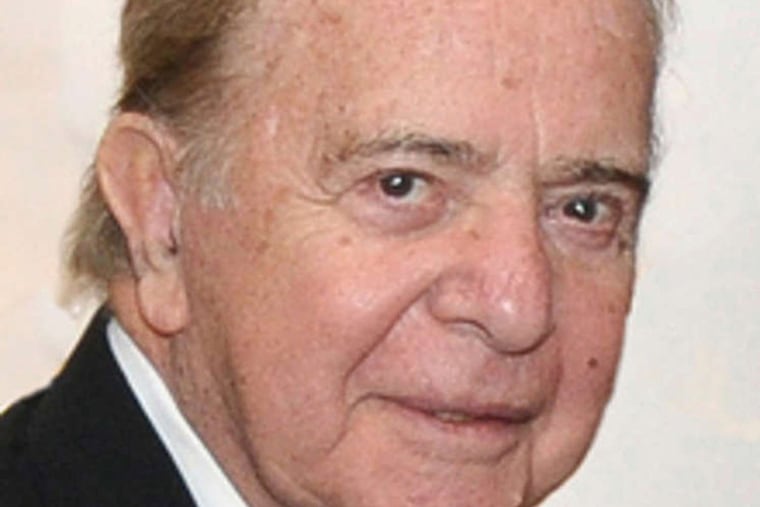Irvin Borowsky, 90, publisher and philanthropist
He started a magazine in 1948 that morphed into "TV Guide."

NO ONE COULD get Irv Borowsky to admit that he had any regrets over losing $3 billion.
In fact, knowing what kind of a guy Irv Borowsky was, it wouldn't have been surprising to discover that he actually got a rueful chuckle when he learned that Rupert Murdoch's News Corp. paid that price for the company that owned TV Guide in 1988.
After all, Irv started a publication in Philadelphia that ultimately morphed into TV Guide, one of the world's richest magazines.
Irv's publication, TV Digest, started in 1948 to list local TV programs, was sold to Walter Annenberg in 1952 for $300,000, half for him and half for his brother Arthur, plus $300 a week for 15 years.
Annenberg, publisher of the Daily News and Inquirer and founder of Triangle Publications, was buying up locally produced TV publications around the country, which he combined to create TV Guide.
Irv Borowsky, who died Nov. 25 at age 90, was getting tired of telling people he had no regrets over the sale.
"When the 150th person asked me if I had any, I developed an answer," he told Daily News film critic Gary Thompson in 1988. "I said that if regrets would make me any happier, then I'd have them."
But he also added, "I was only in my 20s when I started TV Digest. What did I know?"
Irvin J. Borowsky, the son of Polish immigrants, went from the small printing company he started in Philly at age 14 to the creation of a bustling magazine publishing company and printing-equipment manufacturing firm, as well as numerous philanthropic activities that encompassed Jewish causes, programs to foster greater understanding between Jews and Christians, the founding of the National Liberty Museum in Philadelphia, collecting art and giving generously to local educational institutions.
Borowsky was a visionary in the TV world. When he started TV Digest in 1948, there were only about 50,000 TV sets in the entire region. But he saw the future and by the time he sold TV Digest to Annenberg, it had a paid circulation of more than 300,000.
His vision also extended to TV content. In the late '40s, no Hollywood movies were shown on TV, but Irv and his brother made a deal with Channel 6 that if it played movies, the magazine would buy advertising time. Thus, Philadelphians got to see classic films on television possibly before anyone else in the country.
Irv was the youngest of the nine children of Emma and Samuel Borowsky. His father sold flour and other ingredients to bakeries.
Irv grew up in South Philadelphia. One day, he saw an ad for a $5 printing press in Popular Mechanics. It came with a package of type, ink and instructions. Irv was 12 and his future was sealed.
By the time his father died when Irv was 14, he was operating his own printing press and had created his first business, City Wide Press.
He studied printing at Dobbins Technical High School and took evening classes at the Wharton School of the University of Pennsylvania.
In 1946, he launched Foster Manufacturing Co., maker of equipment for printers and publishers, with a plant in Phoenixville.
After he sold TV Digest to Walter Annenberg, Irv started North American Publishing Co., and began acquiring magazines. His first purchase was Audio magazine. Others quickly followed on subjects ranging from sailing to marketing to home remodeling, printing, etc., to reach 24 magazines a month.
In 1975, he bought Cue, the popular magazine of New York nightlife, which he later sold to Rupert Murdoch.
In 1982, Borowsky founded the American Interfaith Institute to join Jews and Christians in common cause. One of its goals was to remove anti-Semitic language from the New Testament. The American Bible Society published the Contemporary English Version, the first New Testament that does not hold the Jews responsible for Jesus' crucifixion.
Borowsky became chairman of the printing and publishing divisions of the Federation of Jewish Charities. He made many visits to Israel, where he met with government and spiritual leaders of the country.
In 1992, he led 700 Evangelical Christians on a tour of early Christian sites in the Holy Land, where they also got to meet leaders of the sciences, technologies, agronomics and education.
Borowsky founded the National Liberty Museum at 321 Chestnut St. in 2000. Its programs and exhibits stress the diversity of life in America. It also has an education center and teacher-training programs.
Irv lectured throughout the world on topics of diversity, faith and cooperation among nations and religions.
Last year, Borowsky and his wife, Laurie Wagman, donated $1 million to Temple University's Tyler School of Art. The Borowsky Glass Studios at the University of the Arts gives an annual award, the Borowsky Glass Prize.
The Borowskys had an extensive art collection, featuring the stained glass of the Russian Jewish artist Marc Chagall, as well as bronzes and other glass work by different masters.
Besides his wife, whom he married in 1979, he is survived by four sons, Scott Borowsky, Ned Borowsky, Ted Borowsky and Andrew Wagman-Christian; two daughters, Gwen Borowsky and Michele Sokoloff; two sisters, Bea Peskin and Charlotte Keil; and 13 grandchildren.
Services: 11 a.m. Friday at Goldsteins' Rosenberg's Raphael-Sacks, 6410 N. Broad St. Interment will be in Shalom Memorial Park.